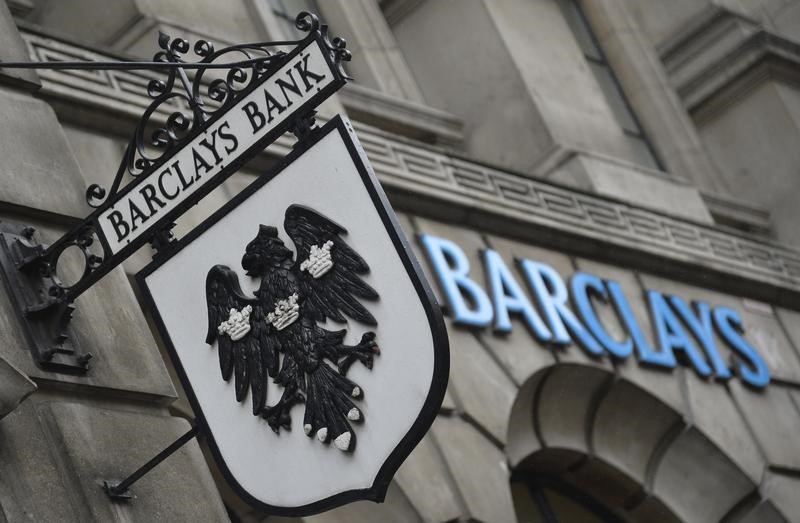By Steve Slater
LONDON (Reuters) - The euro zone's attempt to kick-start its stagnant economy should provide a bright spot for European bank bosses in a results' season that will be grim for investment bank revenues, sluggish for returns and where cost-cutting is key.
Banks were given a fillip last week by a 1.1 trillion euro(0.8 trillion pounds) programme for euro zone central banks to buy government bonds, which is designed to revive the region's economic growth and mean fewer bad loans for lenders. It should also reduce banks' funding costs.
But the stimulus programme does have a downside: it is expected to keep interest rates low for several years, depressing bank margins.
Deutsche Bank's (DE:DBKGn) co-CEO Anshu Jain said QE could cause "real destruction" of net interest margins and banks must quickly adapt models to the new landscape.
It adds to a complex mix of regulatory and investor pressure on bank bosses to find the right size and shape. That is particularly true in Europe, which remains the only region where banks have failed to return to economic profit since the financial crisis.
Jain will be one of the first to outline the impact of the euro zone stimulus plan when Deutsche Bank releases fourth- quarter results on Thursday. His bank is also at the centre of the debate over strategy, and whether it should rein in its global universal banking ambitions and spin off retail banking.
ALL CHANGE?
Deutsche Bank is not alone in assessing if radical change is needed. Rivals including Barclays (L:BARC), Credit Suisse (VX:CSGN), UBS (VX:UBSG), Standard Chartered (L:STAN) and HSBC (L:HSBA) are all changing shape. Analysts said if U.S. rival JPMorgan (N:JPM) is facing calls to consider breaking up, so should firms in Europe.
"Given fixed income continues to shrink, the more obvious answer (than a break-up) is to keep on dieting and optimising the portfolio for today's realities, which means less capital allocated to the wholesale bank and some of the overseas operations," Huw van Steenis, analyst at Morgan Stanley, said.
"Every bank needs to re-evaluate its cost base quite radically in the current environment, because persistently low rates are a huge headwind to retail and wholesale banking profitability," he said. "They need to use technology to transform the operating model and get costs substantially lower."
Banks in Switzerland could be under particular pressure to cut costs after a surge in the value of the Swiss franc, making domestic costs more painful.
Pressure for banks to cut back trading desks will intensify if European investment banks fare even worse than their U.S. rivals, which had a difficult fourth quarter.
In the United States, the big five investment banks' fourth-quarter revenues from fixed income, currencies and commodities (FICC) fell 28 percent from a year earlier and came in at only half the level in the third quarter.
Equities revenues were down 13 percent from the third quarter, while advisory and underwriting fees were up 2 percent on the quarter, according to Reuters' calculations.
Santander's (MC:SAN) move to cut dividends alongside a surprise 7.5 billion euro cash-raising this month could raise pressure on others to plump up capital buffers. Analysts said Credit Suisse and Standard Chartered could cut their dividends.
In contrast, Britain's Lloyds (L:LLOY) is expected to restart its dividend for the first time since 2008. But this can happen only if the UK watchdog is happy with the plan, evidence of the power regulators now wield over the industry.
Euro zone politics also have the potential to hurt banks. Shares in Greek banks tumbled on Monday after anti-austerity party Syriza's election victory raised liquidity concerns.
RESULTS CALENDAR:
BANK REPORTING DATE
Nordea (ST:NDA) Jan. 28
Deutsche Bank Jan. 29
Sabadell (MC:SABE) Jan. 29
SEB (ST:SEBa) Jan. 29
Caixabank (MC:CABK) Jan. 30
Bankia (MC:BKIA) Feb. 2
Julius Baer (VX:BAER) Feb. 2
Danske Bank (CO:DANSKE) Feb. 3
Santander Feb. 3
Swedbank (ST:SWEDa) Feb. 3
BBVA (MC:BBVA) Feb. 4
Handelsbanken (ST:SHBa) Feb. 4
BNP Paribas (PA:BNPP) Feb. 5
DNB (OL:DNB) Feb. 5
Raiffeisen (VI:RBIV) Feb. 9
Intesa Sanpaolo (MI:ISP) Feb. 10
UBS Feb. 10
ING (AS:ING) Feb. 11
Unicredit (MI:CRDI) Feb. 11
Commerzbank (DE:CBKG) Feb. 12
Credit Suisse Feb. 12
KBC (BR:KBC) Feb. 12
Societe Generale (PA:SOGN) Feb. 12
Credit Agricole (PA:CAGR) Feb. 18
Natixis (PA:CNAT) Feb. 19
HSBC Feb. 23
RBS (L:RBS) Feb. 26
Bank of Ireland (I:BKIR) Feb. 27
Erste Bank (VI:ERST) Feb. 27
Lloyds Feb. 27
Barclays March 3
Standard Chartered March 4
